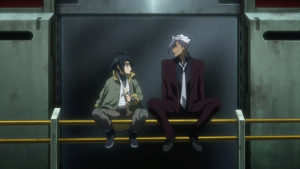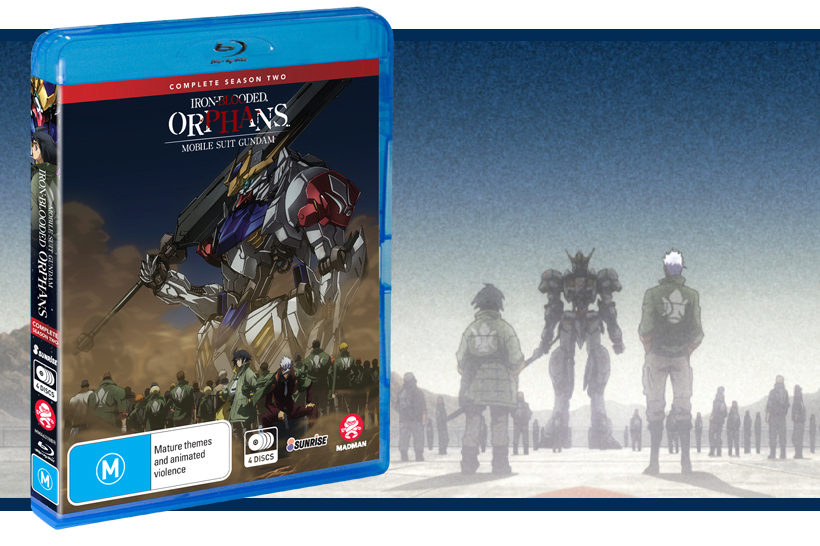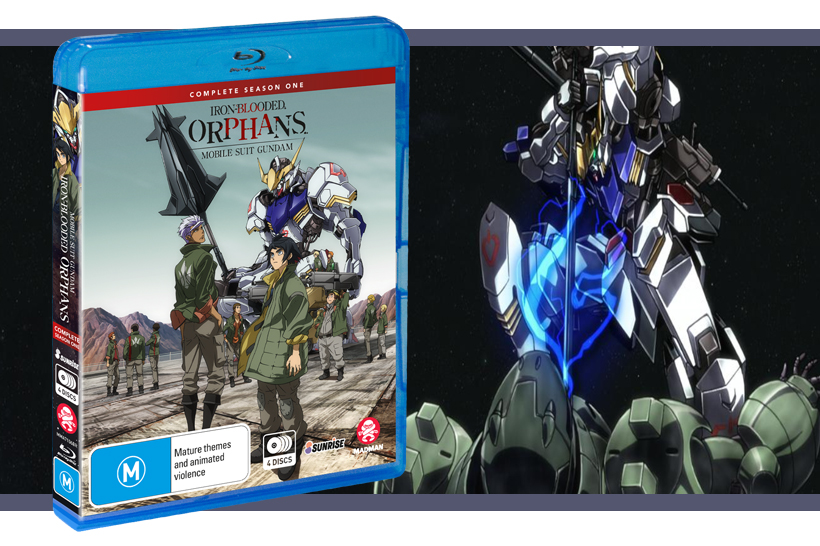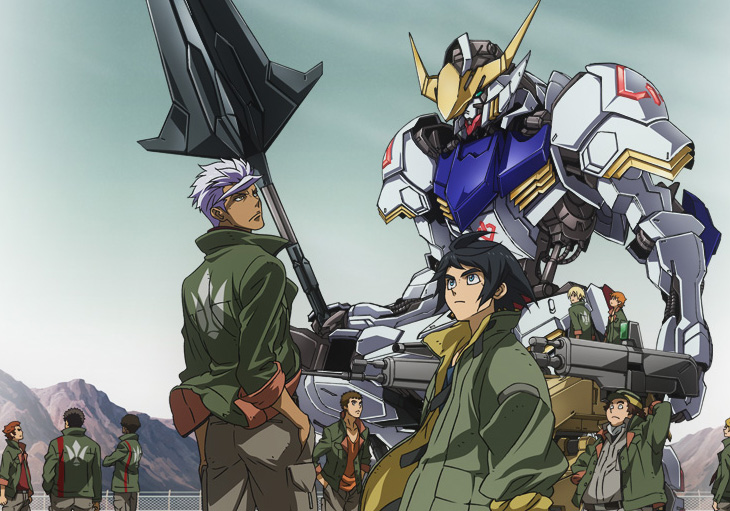The private security company known as Tekkadan has made a name for itself after escorting the revolutionary Kudelia Aina Bernstein to Earth and ensuring that exile Makanai reassumed his position as Prime Minister of the Arbrau nation. Although the losses were great and many Tekkadan members died during the journey, their victory exposed the corruption of the Gjallahorn military faction and allowed Kudelia to begin the process of liberating the Tekkadan member’s home planet of Mars from Earth’s rule. However, even though the world is certainly changing, it is not necassarily changing for the better. Tekkadan’s success as an organisation helmed by child soldiers has further popularised the use of children as cannon fodder and “human debris” in armed conflicts, and has also drawn the attention of dangerous individuals jealous of Tekkadan’s rise to prominence. Tekkadan boss Orga Itsuka and Gundam Barbatos pilot Mikazuki Augus have their work cut out for them as Tekkadan is attacked from all sides – both in the world of business and politics, and on the battlefield.

In my review of the first season of Mobile Suit Gundam: Iron-Blooded Orphans, I spent over 1,000 words gushing about how the series was rejuvenating, engaging and a new addition to my list of favourite anime of all time. This review is the remix to that one, containing the same positive praise and enthusiasm, with the word limit yet to be decided. As a follow up to its first season, Mobile Suit Gundam: Iron-Blooded Orphans Complete Season 2 does what some of the best sequels do – it explores the consequences of the success of the protagonists. In fact, the whole season can be best described as a series of cascading dominoes where every episode screams “your decisions have consequences, regardless of whether those consequences are fair or not.” Since the stakes increase in this fashion as the series progresses, Iron-Blooded Orphans Complete Season 2 feels more melancholic than its predecessor, as losses increase, decisions become messier and conflict becomes unavoidable.

As a person who isn’t a big fan of grimdark hopeless narratives, Iron-Blooded Orphans as a series presented me with an interesting surprise. Misery is present in both seasons of the show, as is expected of any narrative that touches on child soldiers and the exploitation of children. The first season punctuated loss with action that hardened the resolve of the members of Tekkadan to look out for each other and continue their journey. The second season continues this tradition, but the misery feels much more pervasive and losses more imminent as threat after threat waylays the Tekkadan crew and those who associate with them. But the losses experienced in Iron-Blooded Orphans Complete Season 2, like those of its preceding season, never feel cheap. This season constantly reminds the viewer of the Tekkadan way of life: fight with everything you have, because there is nothing to return to and Tekkadan is your only family. It’s a desperate creed, but it resonates given the experience of those in Tekkadan, an organisation made up of ex-human debris and kids with nowhere else to go who throw their all into serving the only people that gave them a chance. This devotion was established throughout the first season, with Mikazuki’s unwavering trust in Orga, and the swift vengeance sought by Tekkadan each time one of its members fell, and it remains a constant theme in Iron-Blooded Orphans Complete Season 2. As a result, each loss in the season feels complex, acting as both a reminder of Tekkadan’s fragility and the consequences of their decisions while also causing Orga and the crew to try and desperately reaffirm Tekkadan’s creed to keep moving forward as things fall apart.

The characters in the series continue to be likeable and engaging, particularly the Tekkadan members and the crew of the transport company Turbines. There’s some neat character growth continuing on from the previous season, with different characters assuming different roles such as Eugene who becomes the second in command of Tekkadan, and Takaki who ends up in charge of Tekkadan’s Earth branch for a time. Tekkadan cook Atra and the now ADMOSS company creator Kudelia also continue to explore their relationship with each other and Mikazuki, which fluctuates between hilarious and touching depending on the scene. More desperately, Orga struggles under the weight of his responsibilities and how to make the right decisions for his Tekkadan family, while Mikazuki struggles to comprehend a world where he doesn’t need to fight in Barbatos, thinking that it would be better for him to never see that kind of world. The second season also spends a lot of time exploring the new blood who have joined Tekkadan, both the ex-human debris that were rescued from the Brewers during the first season like Aston and Derma, and fresh recruits who join Tekkadan because it is the only place they could go or because of its status as an up and coming company. Former Brewers pilot Aston is particularly great and has some time to shine this season as his relationship with Takaki and Takaki’s little sister Fuka progresses and he begins to open up after shutting his feelings away for so long just to survive his time as human debris. It’s amazing that a series with such a sizeable cast is able to dedicate meaningful time to so many of its characters, but it’s absolutely necessary in a show that caresses tragedy and deals with the themes that Iron-Blooded Orphans touches on.

I applauded Iron-Blooded Orphans in my previous review for incorporating politics in a way that felt meaningful and engaging because the politics directly complimented the struggles of the Tekkadan crew members. This season feels a little bit clunkier in this regard, with some episodes focusing quite heavily on the actions of newly appointed commander of the Outer Earth Orbit Regulatory Joint Fleet McGillis Fareed and his role in the Seven Stars, the representatives that manage Gjallahorn. There were times I found myself wishing that these episodes would revert to focusing on Tekkadan, but these moment were thankfully punctuated with genuinely interesting episodes involving the Seven Stars representatives in the field with their mechs or influencing important plot points that caused chaos for Tekkadan and McGillis and his plans to influence Gjallahorn. Another minor gripe I have is that while the season feels thematically consistent for the most part and touches on some interesting questions, it misses a thematic opportunity with McGillis and his fiancée Almiria Bauduin. McGillis and Almiria have been in an arranged marriage since the first season, and I feel like Iron-Blooded Orphans missed its chance to connect Almiria’s position as a ten-year-old fiancée to the show’s overall theme of the exploitation and suffering of children. This is particularly strange given what is revealed about McGillis’ experiences as a child, and while this may have been touched on in the series by subtext, I was left waiting for a clearer thematic connection to be made that never happened, which left the whole subplot between the two lacking.

Much of what I have said about Iron-Blooded Orphans Complete Season 2 is beat for beat what I felt and still feel about the first season. The characters are excellent, the stakes are stake-y, losses have weight and sorrow is earned not abused. Iron-Blooded Orphans is also technically enjoyable, the sound effects during the mech battles are excellent and add to the satisfaction of each encounter. Similarly, the soundtrack in the main show and the songs from the opening and closing sequences perfectly compliment the tone of the show. Fighter by KANA-BOON was my personal favourite during season two, but they were all excellent. Iron-Blooded Orphans Complete Season 2 is a compelling addition to the series and a satisfying conclusion (although this may vary depending on your mileage for tragedy). I look forward to re-visiting the series again soon, which is one of the highest forms of praise I can offer as I rarely revisit a show once I’ve finished it.
A review copy was provided by Madman Entertainment to the author for the purpose of this review.
©SOTSU・SUNRISE・MBS



